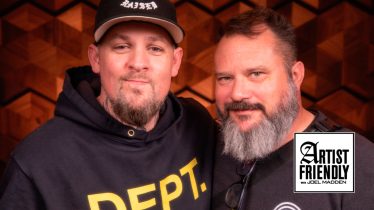Oliver Tree is all about "mixing together things that maybe don’t fit"
Love him, hate him, stick your tongue in his mouth or bash him in the head with the business end of a dockless scooter, Oliver Tree isn’t going to go away quietly. And thank your favorite deity for bringing him on the planet. Because whether your mom wouldn’t be caught dead in that ’70s purple jacket and your dad will deny owning a pair of JNCOs as much as he does his collection of Crazy Town tour tees, Tree is probably the most sensitive weirdo at this moment in alt-pop.
“I don’t listen to any music right now, so I’m out of the loop,” he offers when asked if there was a particular music scene he found completely insincere. “I don’t feel like I can give you an educated answer on that. But I think there’s so much going on. I think any of it can work, and it’s hard for me to really pick one out.” He pauses.
Read more: Oliver Tree helps us laugh through the pain on “Life Goes On” –listen
“Gosh, I’m so ignorant as far as what’s going on,” he continues. “And I think that’s something that helps me out as an artist because ignorance is bliss. As far as listening to what’s happening, my music would probably just sound generic and the same as every single modern artist there is [with] Auto-Tune and whatever. But you know, from my point of view, I think ignorance is bliss in this situation.”
On his debut album, Ugly Is Beautiful, Tree delivers a stack of undeniable hooks, all couched in idioms that you may have heard before, just not the way he has. Pop, hip-hop and sing-songy bedroom indie rock all get worked over through his sensibilities. Helping him along are a series of big-production videos, equal parts hilarious and WTF-conjuring, that are racking up YouTube numbers in the millions and gaining significant attention on streaming services.
Given Tree’s creative arc of crazy videos, ridiculous decisions and weirder obsessions (seriously, scooters?), it’s apparent that his insatiable taste for the absurd is constantly peaking in the red. When Tree says there’s “nobody doing what he’s doing,” he’s talking about people in this century. He’s got an attitude that the late transgressive comedian Andy Kaufman would approve of (go ahead, Google him)—just enough knowledge of international avant-garde cinema to be dangerous and a vocal style that’s the shared space in a Venn diagram of a playground tantrum, a wounded seal and the kind of whine you make 20 seconds after your hand gets accidentally smashed in a refrigerator door.
Read more: 10 artists who completely took off after their debut albums
These days, it’s pretty much industry standard that whenever a media outlet gets on the phone with a celebrity/pop star/follicle-challenged savant, there’s somebody listening on the other end. Sometimes it’s a control-freak manager, but usually, it’s an agent from the record label’s publicity company. If the artist is feeling uncomfortable with the “realness” of the situation, they might text the hidden third party, who will suddenly appear on the line asking the interviewer to change the subject, “apologize” for not being able to discuss a sensitive issue due to a pending (imaginary, other) issue or end the interview abruptly.
To his credit, Tree instructed the fine people at his label’s publicity department to stand down. If you ever watched any of Tree’s videos, you know he’s always in for a good time. Yeah, millennial buzzwords such as “transparency” and “being real” are fine to discuss the measure of purported sincerity in anyone’s work. But Tree doesn’t do things to get bored. He’s all in for his own entertainment.
Read more: AJR knew exactly what they needed to say on ‘OK ORCHESTRA’
Which is why Alternative Press and Tree are joined by someone identifying themselves as Jeremiah Jeffrey, Tree’s “lawyer,” whose job he defines as to sit in “in case any sensitive situations may come up during the call.” One can vision Tree and his legal lad wringing their hands over the fuckery they are about to pull during the course of their interview.
OLIVER TREE: I’m gonna give you a quick heads-up. My lawyer’s here. He does all of my phone calls. And he’s just going to make sure I don’t say anything that might be harmful to my image.
FAKE LAWYER: This is Jeremiah Jeffrey. I represent Oliver. There are some sensitive topics that my client is not at liberty to discuss at this time. So, I’ll just be here to make sure we all stay on track. Nothing to be alarmed about. Merely a formality.
A formality. Right. Let’s start this way, then. Oliver, a lot of people who I’ve talked to about your work say you’re cool AF or that you’re annoying or straight-up weird. I think you’re easily bored, and you want to create a higher bar for everybody else. So who’s right, and who’s wrong?
TREE: I think beauty is in the eye of the beholder. I can’t really decide that for you. That is something you have to decide for yourself. What is it for you?
I think it’s a fascinating look at something new and current but also has references to other things that still resonate today. I think you’re creating things out of other things that people are unaware of or something you have personal experience with.
TREE: I think the reality is it’s already all been done. So at this point, you’re trying to pretend like you even invented anything, maybe a little bit unaware of what’s happened in the history leading up to this. I think everything’s already been done at this point. Can we agree on that, or do you think there’s still new territory in music, specifically?
Well, I think everybody talks about cultural appropriation or the sterility of certain types of technology and all that stuff. But I think in order to move culture along, it’s all fair game. I think you feel that way, too, just by listening to the record.
TREE: Definitely.
Is there a difference between the Oliver Tree onstage or in a video and the guy I’m talking to right now?
TREE: What do you mean by “difference?” What are you referring to exactly?
I would imagine that there’s a lot of issues with control, so to speak. What you want to see, a vision that has to be a certain way or it’s not going to happen at all. I think your fans expect you to be a certain way that’s different from the guy I’m talking to right now.
TREE: Well, here’s the thing. Yeah, we’re all one. However, in life, different things require different energy. So if I were to scream at you right now in the same way I would scream at the audience during the live show, I think that would make you a bit uncomfortable.
Probably. Unless you were using it to make a point that couldn’t be conveyed in any other way.
TREE: [suspiciously] Riiiight. But I think in general, we just gauge our energy on what the situation calls for. So, yeah, of course there’s going to be a difference between how I would talk to the audience during a live show.
I’m thinking of the concept of, say, the way an actor or a standup comedian is always “on.” Right now, I think you’re sensitive to what’s going on. It’s an articulate conversation. Do you know what I mean by that?
FAKE LAWYER: This is Jeremiah chiming in here. I just want to advise my client. I think we can’t say anything further on this subject.
On which subject?
FAKE LAWYER: The subject of his persona onstage and off the stage. It’s a sensitive matter at this time.
Could you explain that aspect of the sensitivity? Because we’re not talking about any specific person or moment.
FAKE LAWYER: There are several litigations he has been involved in from the past tour involving his character. We’re not at liberty to disclose certain things pertaining to this. It’s hard to say. I can’t really explain any further, but there is an ongoing case. And once that is over, we will be able to go further into Oliver’s personality. But this time, we’re going to decline any further comments.
Film director David Lynch is pimping his online MasterClass with a video explaining that “All you need is an idea.” So where do your ideas stem from? Or does David Lynch need a spiral-bound notebook to catch up with you?
TREE: Mmmm…
FAKE LAWYER: My client finds this question slightly disrespectful. Can you rephrase the question?
We can rephrase this question as, “Where do your ideas stem from?”
TREE: The imagination.
Tree’s major-label debut, Ugly Is Beautiful, might be the artistic pinnacle for a generation who knows what they want but can’t articulate it. For the young ones who change their meds more than bedsheets. The ones who thought they had a community at Warped Tour but got tired of receiving side-eye from Pierce The Veil fans as they wore their 1D shirts. The students who are always picked last for gym-class teams and prom dates. Not cool, not smart, not beautiful or all those other fleeting things that measure modern self-worth.
Tree pulls off some clever wordplay on tracks such as the sing-songy living-the-dream joy of “Life Goes On” (“Work all day/And then I wake up”). But then he’ll deliver some serious despondency, as found on the hip-hop track “Joke’s On You!” (“I’m close to the edge/People tell me I should jump”). Ugly has moments of snotty indie rock (“Waste My Time,” “Again & Again”) that fall somewhere between Beck and some errant Front Bottoms demos. Tree’s debut album might be the perfect embodiment of art for a generation raised on MP3 playing and streaming devices. They carry no embarrassment of the guilty pleasure and are completely unaware of the warring mentality music cultures have held against each other for generations. (Go ask your cool parents—or similarly awesome aunts and uncles—who got slurred for wearing Ramones tees and dyeing their hair colors not yet found in nature, and they’ll explain it to you.) Tree is the least likely rock star on the planet, which makes him qualified to be a figure to lead a new generation of listeners into new realms, whether it’s a Spotify playlist or into a NORAD missile silo.
“I appreciate that,” Tree says. “The crux of the Oliver Tree project is juxtaposition. It’s about mixing together things that maybe don’t fit but somehow led me to fusing genres on the album.
“To be blunt, I think it’s time for ‘alternative’ to have a bit of a facelift,” he continues. “This is so boring and played out. I can’t imagine anyone finding it intriguing to see people doing the same thing that’s been done in the alternative space for the last 30 years or whatever. If you don’t change it up, at what point, at what hope did alternative even have to survive? I consider ‘alternative’ something a little more left of center. I guess I don’t define it by genre.”
Read more: Hear grandson and Dillon Francis join Oliver Tree’s “Cash Machine” remix
If Tree’s post-everything sensibilities are defined by whatever he’s feeling at the time, the lyrical influences aren’t as cut and dry. He vacillates between self-deprecation to downright anguished about his perceived shortcomings. Yet, there’s also a lot of pride in what he’s doing, refusing to drink anybody else’s tea or catch their shade. Not surprisingly, he refuses to discuss any specific lyrics, whether they’re from his lighter fare to the more self-critical exercises.
“I really don’t like to comment on my lyrics because I don’t want what I had interpreted them to take the message and do that for what the listener is going to make it,” he says. “These songs are open-ended, which means that they can be applied in different ways to your own life, at different points in your own life. So the same song could have a different meaning to someone at various points in their life.
Read more: 10 songs with lyrics that don’t actually mean what you think they do
“Yes, there is a message and an intention behind it, but I leave them vague and ambiguous intentionally, with the hope that more listeners can take more out of it and not have it be something that’s so niche or so specific to one mood or one feeling or one specific experience.”
After all the cautionary tales, emotional excavation—or just what’s ricocheting through Tree’s noggin when the “record” button is on—the takeaway his fans get is simple but no less diminished.
“I would say the real message behind this first album is pretty plain and simple: The title Ugly Is Beautiful,” he explains. “So the concept behind it is no matter how strange you look, no matter how ugly you feel, you are beautiful. That’s the core value.”
So definitely in four years’ time—when you’ve gone quadruple platinum and I think you’ll be probably done paying back the label to make the videos—it’ll be a completely different look.
FAKE LAWYER: Hi, this is Jeremiah Jeffrey again. Unfortunately, my client is not allowed to comment on this matter.
On what matter? What he’s going to do with his money in the future?
FAKE LAWYER: Yes, there is an elaborate plan. Unfortunately, we are not allowed to talk about that.
TREE: Are you asking me about the future trajectory of the project?
Four years from now, you’re not going to be dressed like that, and what are you going to be spending your money on?
TREE: Oh, I didn’t say I’m not going to be dressed like that.
I thought you’d be changing in keeping with your constant evolution program.
TREE: Eventually. We’ll never know, will we? We’re going to have to wait and see. Who knows at this point? I really wish I could say it. Jeremiah, you want to chime in?
FAKE LAWYER: Unfortunately, we’re not allowed to comment on the subject.
This cover story originally appeared in issue 379 available here.







